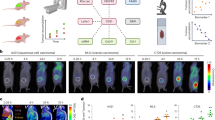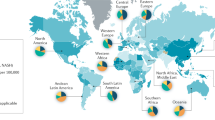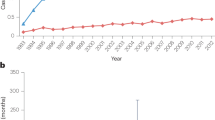Abstract
Recent studies have shown that various gastrointestinal tumours express substantial amounts of vasoactive intestinal peptide (VIP) receptors. Based on these observations, we have developed a receptor scintigraphy using [123I]VIP as a radioligand. An initial series performed at our institution showed promising potential for visualization of various gastrointestinal adenocarcinomas by means of [123I]VIP. In this article, we now report the results obtained in 80 consecutive patients with colorectal adenocarcinoma. Eighty consecutive patients with histologically verified colorectal cancer underwent scanning by means of [123I]VIP (1 microg, approximately 150 MBq). Thirteen patients were free of tumour after complete resection of Dukes' C cancer, eight patients presented with primary and 14 with locally recurrent tumours but were free of metastases. Ten patients had locally recurrent disease and liver, lung or lymph node metastases. Disease confined to organ metastases (i.e. liver, lung or lymph nodes) was present in 35 patients. The size of the primary or recurrent tumours ranged between 3 and 6 cm, and the size of metastases was between 1 and 13 cm in diameter. Scan results were evaluated independently by two nuclear medicine physicians in a blinded way, and results were then compared with computerized tomography (CT)scans not older than 4 weeks. Seven out of eight primary (87%) and 21 out of 24 (82%) locally relapsing cancers were imaged with [123I]VIP. Negative VIP scans were obtained in all 13 patients in whom the cancers had been curatively resected. All patients with lymph node metastases showed positive VIP scans (four out of four), and positive scans were obtained in 25 out of 28 (89%) patients with liver metastases and in two out of three cases with lung metastases. In four patients with relapsing cancer, the VIP scan indicated the presence of disease before CT, and in two patients the diagnosis of scar tissue instead of a local recurrence of rectal cancer as suggested by CT could be established. We conclude that [123I]VIP receptor scanning is a sensitive method for radioimaging of colorectal cancer with the potential to provide valuable additional information to conventional radiological methods.
This is a preview of subscription content, access via your institution
Access options
Subscribe to this journal
Receive 24 print issues and online access
$259.00 per year
only $10.79 per issue
Buy this article
- Purchase on Springer Link
- Instant access to full article PDF
Prices may be subject to local taxes which are calculated during checkout
Similar content being viewed by others
Author information
Authors and Affiliations
Rights and permissions
About this article
Cite this article
Raderer, M., Kurtaran, A., Hejna, M. et al. 123I-labelled vasoactive intestinal peptide receptor scintigraphy in patients with colorectal cancer. Br J Cancer 78, 1–5 (1998). https://doi.org/10.1038/bjc.1998.433
Issue Date:
DOI: https://doi.org/10.1038/bjc.1998.433
This article is cited by
-
Peptide Receptor Imaging
American Journal of Respiratory Medicine (2002)
-
The expression of receptors for vasoactive intestinal peptide and secretin in colon neoplasms
Chinese Journal of Cancer Research (2001)



